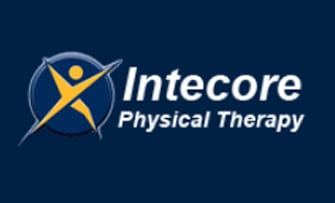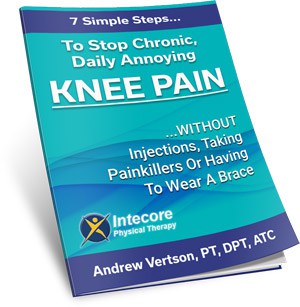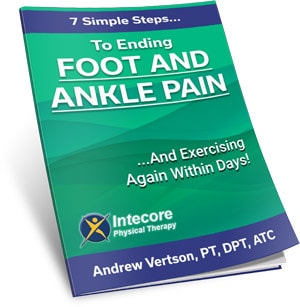
Struggling to find a way to sleep comfortably with neck pain? You’re not alone. Countless individuals toss and turn each night trying to escape the discomfort, only to be waking up with neck pain feeling tired and sore. Neck pain can significantly disrupt your sleep, leading to a cycle of fatigue and discomfort that affects your daytime activities and overall quality of life. But why does your neck decide to turn your quest for restful slumber into a nightly challenge, and more importantly, how can you overcome it?
In this easy-to-read guide, we’ll explore practical tips and strategies to help you sleep comfortably despite neck pain. Say goodbye to counting sheep and hello to waking up refreshed and ready to tackle the day!
More Articles Like This From Intecore PT:
Top 5 Common Posture Problems and How To Fix Them
5 Causes of Neck Stiffness and How to Combat Chronic Neck Pain
Can Physical Therapy Help A Stiff Neck?
Table of Contents
Assessing your sleep environment
Creating a sleep environment conducive to comfort and support is essential, especially when dealing with neck pain from sleeping. Your sleep environment includes everything from your pillow and mattress to the overall ambiance of your bedroom. Let’s dive into how you can optimize it to support your neck and promote a pain-free night’s sleep.
Choosing the Right Pillow for Neck Pain
The pillow you choose plays a pivotal role in maintaining proper neck alignment throughout the night. A pillow that’s too high or too firm can angle your neck unnaturally, while a pillow that’s too soft may not offer enough support.
What to Look For:
- Contour Pillows: These are designed to provide support by following the natural curvature of your neck and head. Memory foam options are particularly beneficial as they mold to your specific shape.
- Adjustable Pillows: Pillows filled with materials like buckwheat or shredded memory foam allow you to adjust the height and firmness to your comfort level.
- Neck Support Pillows: Some pillows are specifically designed to offer extra support to the neck area, helping to ensure your spine remains aligned.
Optimizing Your Mattress and Sleeping Position
Your Mattress: Sleeping on a supportive mattress is just as crucial as the right pillow. An overly soft mattress can cause your body to sink, misaligning your spine, while a mattress that’s too firm may not accommodate the natural curve of your spine, exacerbating neck pain. Ideally, aim for a medium-firm mattress that provides a balance of support and comfort.
Your Sleeping Position:
- Back Sleepers: Ensure your neck and head are supported without being propped up too high. A small, rolled-up towel under the neck can enhance support.
- Side Sleepers: Your pillow should fill the gap between your ear and shoulder to keep your neck aligned with the rest of your spine.
- Stomach Sleepers: This position is generally not recommended for neck pain as it forces your neck to turn to one side. If you can’t sleep any other way, try using a very thin pillow or none at all to keep your neck as neutral as possible.
Establishing a bedtime routine
A consistent bedtime routine signals to your body that it’s time to wind down and prepare for sleep, which can be particularly helpful when you’re dealing with neck pain. A calming sequence of activities before bed can reduce stress and muscle tension, making it easier to fall asleep and stay asleep.
What to Include:
- Gentle Stretching: Incorporate gentle neck and shoulder stretches to relieve muscle tension. Focus on slow, soothing movements rather than deep stretches.
- Limit Screen Time: The blue light from screens can interfere with your body’s natural sleep cycle. Aim to turn off electronic devices at least an hour before bed.
- Quiet Activities: Engage in quiet, relaxing activities such as reading a book, listening to soft music, or practicing meditation to help calm your mind.
Incorporating Relaxation Techniques
Relaxation techniques can be a powerful tool in managing neck pain and improving sleep quality. Techniques such as deep breathing, progressive muscle relaxation, or guided imagery can help reduce physical and mental tension, allowing your body to relax more fully into sleep.
How to Practice:
- Deep Breathing: Focus on taking slow, deep breaths, inhaling through your nose and exhaling through your mouth. This can help reduce overall tension.
- Progressive Muscle Relaxation: Tense and then gradually relax each muscle group in your body, starting from your toes and working up to your head.
- Guided Imagery: Visualize a peaceful scene or story to divert your mind from pain and induce relaxation.
Creating a Comfortable Sleep Environment
The ambiance of your bedroom can significantly impact your ability to fall and stay asleep, especially when you’re experiencing discomfort. Aim to create a space that promotes relaxation and minimizes sleep disturbances.
Tips for Comfort:
- Temperature: Keep your bedroom at a comfortable, cool temperature. Overly warm rooms can disrupt sleep patterns.
- Noise: Reduce noise levels with earplugs, white noise machines, or apps that provide soothing sounds.
- Lighting: Use blackout curtains or a sleep mask to block out light, creating a dark environment conducive to sleep.
By establishing a soothing bedtime routine, incorporating relaxation techniques, and optimizing your sleep environment, you can create the ideal conditions for a restful night’s sleep despite neck pain. Remember, consistency is key; give these strategies some time to take effect, and adjust as needed to find what works best for you. If neck pain continues to interfere with your sleep or daily activities, consider seeking advice from a healthcare professional.
Implementing neck pain management techniques during sleep
Managing neck pain effectively can significantly improve the quality of your sleep. Here are some techniques to reduce discomfort:
Stretching Exercises Before Bedtime
Incorporating gentle stretching exercises into your bedtime routine can alleviate tension in the neck and shoulders, preparing your body for a restful night. Focus on slow, deliberate stretches that target the neck area, avoiding any movements that cause pain. Consistent practice can help maintain flexibility and reduce the likelihood of waking up with stiffness.
Applying Heat or Cold Therapy for Pain Relief
Heat therapy can soothe stiff muscles, while cold therapy may reduce inflammation and numb sharp pain. Experiment with a warm compress or heating pad on your neck for about 15-20 minutes before bed for relaxation and pain relief. Alternatively, if inflammation is the culprit behind your neck pain, applying a cold pack for 10-15 minutes can offer relief. Always protect your skin with a cloth barrier to prevent burns or frostbite.
Additional Tips for Sound Sleep with Neck Pain
- Maintaining Good Posture During the Day: Your daytime posture can have a significant impact on neck pain and sleep quality. Strive to keep your head aligned over your spine and avoid slumping or craning your neck forward, especially when using electronic devices.
- Avoiding Activities That Exacerbate Neck Pain: Be mindful of activities that may worsen your neck pain, such as prolonged sitting without breaks, carrying heavy bags on one shoulder, or sleeping on your stomach.
Extra Suggestions for a Better Night’s Sleep:
- Create a Supportive Sleep Space: Ensure your sleeping position and environment support spinal alignment. Consider the use of body pillows or specially designed cushions for extra support.
- Limit Caffeine and Heavy Meals Before Bed: Both can disrupt your sleep cycle, making it harder to fall asleep or stay asleep through the night.
- Stay Hydrated: Adequate hydration is crucial for overall health and can also affect muscle health. However, try to limit fluid intake right before bed to avoid disruptive nighttime trips to the bathroom.
Ready to Get Help with Physical Therapy?
If you’ve found this blog helpful and are eager to get the help you deserve we invite you to take the next step with us. To find out more, click here to fill out this form and tell us more about what’s going on, and our team will be in touch. You can also give us a call here: 949-565-4944.
- 7 Ways to Get Rid of Tension Headaches Naturally - July 1, 2025
- Why Are My Feet Swollen? Common Causes Explained - June 2, 2025
- What Is Restless Leg Syndrome? Symptoms, Causes, and Relief Options - May 5, 2025












